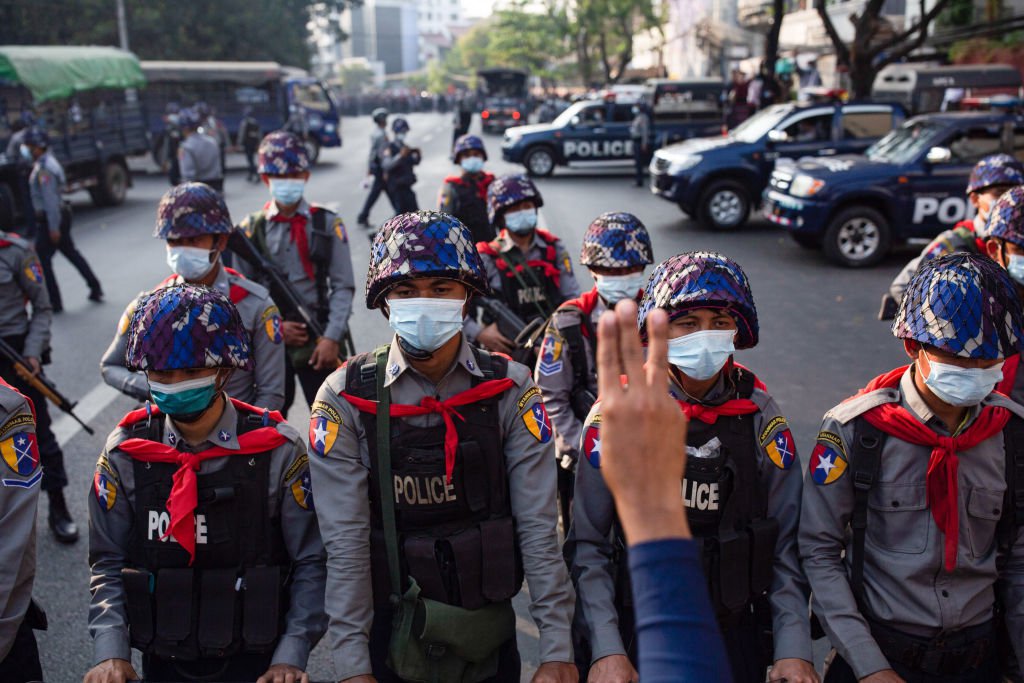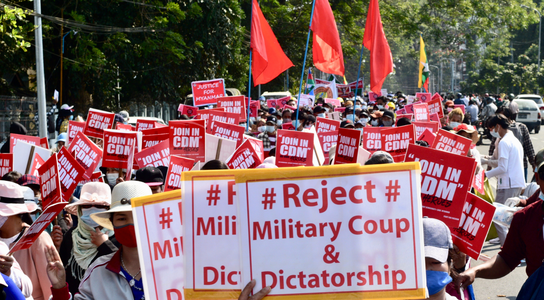Since Myanmar’s military seized power in a coup just over three months ago, more than 765 people have been killed by state security forces and over 4,700 people have been arrested, including the country’s democratically elected leaders.
Hundreds have been shot in the streets, others taken from their homes in nighttime raids, many turning up dead with bruised and broken bodies. More than 50 children have been killed, the youngest just six years old shot in her home. There are also disturbing reports of torture and sexual abuse by state forces.
The internet has been blocked, leaving most people without access to information at a time when they need it most. Scores of journalists have been arrested, and media organisations shuttered.
Armed conflict is intensifying on the country's borders between the military and ethnic armed groups, with heavy fighting involving the Kachin Independence Army and Karen National Liberation Army in Kachin, Northern Shan, and Kayin States already displacing more than 50,000 people, according to the United Nations High Commission for Refugees. Ethnic minorities, who already bore the brunt of decades of military abuse, are being hit particularly hard in this renewed armed conflict, as the military has bombed civilian villages along the Thai and Chinese borders with fighter jets.
Meanwhile, the country’s economy is in freefall, with estimates that it could shrink by 20% this year and some financial analysts warning that “there is no worst-case scenario which we can rule out” when it comes to the economic costs of the coup. All of this comes in the midst of the Covid-19 crisis, which the coup threatens to make worse, as government efforts to tackle the pandemic have been overtaken by the military’s power grab.
The situation is dire with the United Nations World Food Program recently warning that up to 3.4 million people in Myanmar could go hungry this year and the United Nations Development Program has forecast that nearly half of Myanmar’s population of 54 million could slide into poverty from the combined impact of military rule and COVID-19.
A democratic uprising

Riot police stand guard at a demonstration in February 2021. Aung Kyaw Htet/SOPA Images/LightRocket via Getty Images
In the wake of the coup, a civil disobedience movement (CDM) has emerged in Myanmar. This has seen millions of people of all ages and backgrounds take to the streets to demonstrate, with tens of thousands of state employees, doctors, bankers, and others refusing to work, despite the threat of brutal repression and job loss. The CDM has brought together representatives of many of Myanmar’s ethnic groups with the Bamar majority, creating a new common purpose as they work to defeat the military, despite a history of mistrust.
The protest movement has focused on non-recognition of and non-cooperation with the illegitimate military regime, with protestors refusing to work for the state or pay taxes and using other strategies to prevent state functions and deny resources to the junta.
People across the country have boycotted military-owned and military-linked businesses. This is having an impact, with the Japanese beer company Kirin announcing an end to its business relationship with its military partner, Myanma Economic Holdings Limited (MEHL), and other international companies and individuals moving to cut ties with military-linked enterprises.
Myanmar civil society and the body representing elected representatives, the Committee Representing the Pyidaungsu Hluttaw (which recently formed the National Unity Government), have also made public calls to international governments and companies to support their efforts by ending business relationships with the military. These calls are specifically designed to stop the military from earning revenues they can use to sustain their power and fund their abusive activities, and to prevent them from illegally looting state revenues.
The international response so far
While the people of Myanmar have been bravely standing up to the military regime, the international response to the coup has so far been uneven.
Myanmar’s neighbors, particularly China and some Southeast Asian countries, have resisted taking meaningful action to pressure the military. Instead they have offered little beyond weak commitments to hold further discussions and muted condemnation of violence on “all sides”, ignoring the fact that it is the military that instigated the violence and has perpetrated the vast majority of it.
While some regional governments have been more outspoken, the fact that military leader Min Aung Hlaing has ignored a “five point consensus” agreed at an Association of Southeast Asian Nations (ASEAN) summit last month shows just how little the junta respects the regional body’s authority.
The response from the US, UK, and EU has been more robust, with all three adopting measures designed to pressure the Tatmadaw to reverse course. Sanctions imposed in the initial period after the coup targeted military officers and the entities most directly linked to human rights abuses and the military takeover with visa bans and asset freezes.
As violence against civilians escalated, first the United States, and then the United Kingdom and European Union sanctioned military-owned conglomerates MEHL and Myanmar Economic Corporation (MEC) and their subsidiaries. The most visible of the military’s vast business interests, these two conglomerates have massive stakes across the economy, from cigarettes to telecoms, banks insurance, ports and natural resources. The U.S. has also sanctioned three state-owned enterprises that are now controlled by the military, designating the Myanmar Gemstone Enterprise, Myanmar Timber Enterprise, and Myanmar Pearl Enterprise.
What still needs to be done
These targeted economic sanctions are welcome steps to help undermine the military, but more needs to be done by the international community to both cut off sources of funding to the regime and deny its legitimacy. Most important is a coordinated international response by global governments, which includes Myanmar’s key neighbors and regional financial hubs.
The military regime is not the legitimate government of Myanmar, the coup was executed illegally and outside the boundaries even of Myanmar’s military-drafted constitution. Myanmar’s neighbours should therefore follow the lead of other countries around the world by making it clear that the regime is not a legitimate governing body. Members of the military regime should not be allowed to represent Myanmar in international organisations and should be excluded from international forums, or should only be included along with members of the National Unity Government.
The international community should also deny the military access to the money belonging to the legitimate government of Myanmar. This means cutting off access to foreign currencies, which the military needs to sustain itself, administer the country and purchase weapons and technology to carry out atrocities against civilians.
The single largest source of foreign exchange for Myanmar is the oil and gas industry, which includes joint venture partnerships with international oil and gas majors such as Chevron and Total. Oil and gas revenues earned the government up to US$1.5 billion in 2019. Governments should heed calls from Myanmar civil society by placing sanctions on the state-owned Myanma Oil and Gas Enterprise that will block payments from going to the military. Instead, this money should be placed into restricted escrow accounts for future use by the legitimate government.
While the oil and gas industry should be the international community’s main target, countries should also follow the US and place sanctions on Myanmar’s jade, gemstone, pearl and timber state-owned enterprises to further help restrict funding to the regime. A gemstone emporium held by the regime in April and a surge in illegal mining and logging on the country’s borders demonstrates the importance of these sources of funding to the generals, which they are continuing to use to bankroll their abuses. Sanctions including import bans on these military-dominated industries would strike a blow against the military regime while having only a limited impact on civilians due to the small overall size of the industries.
Beyond squeezing the regime’s access to revenues, a global arms embargo is needed in recognition of the fact that the military is using weapons to commit atrocities against civilians.
The international community also needs to do more to assist those on the frontlines of the fight for freedom from military rule by prioritising humanitarian aid, support for the CDM and civil society groups, advocating for the release of all political prisoners and the lifting of the internet ban, and supporting asylum seekers, refugees and ethnic minority groups.
As Myanmar confronts the return of the brutal military junta just years after it began its fragile transition to democracy, governments around the world must take stronger action to respond to the calls of the people of Myanmar and help secure a more peaceful, democratic future for the country.

